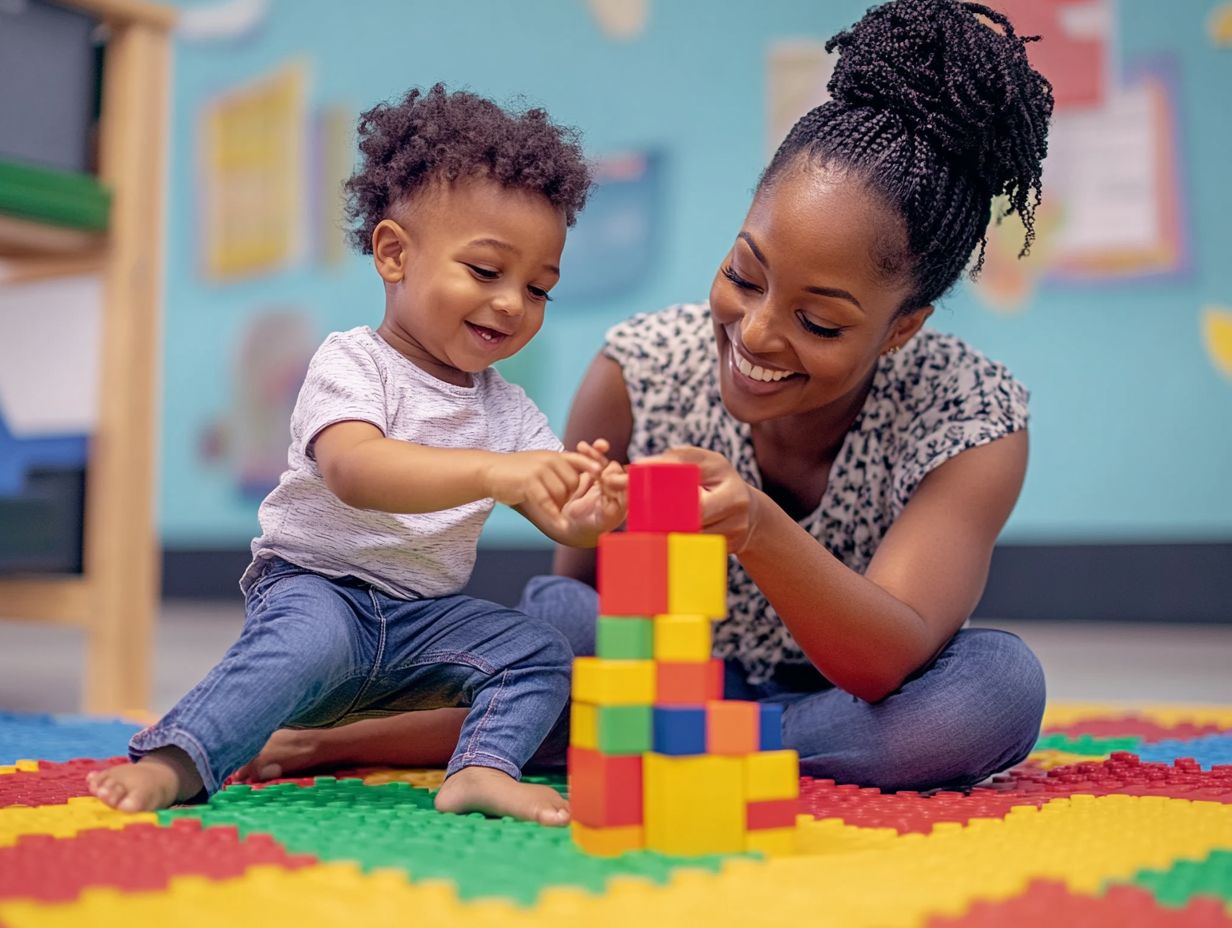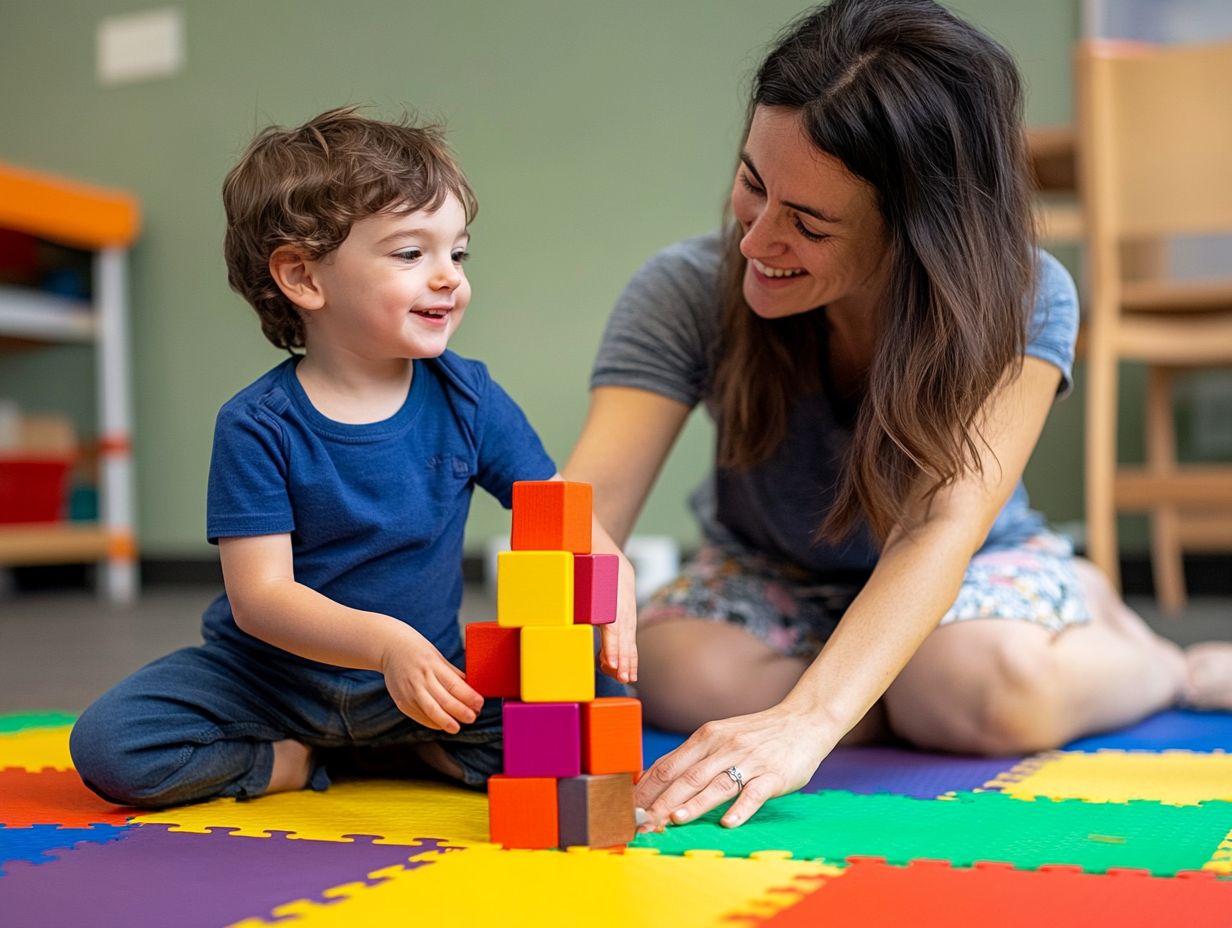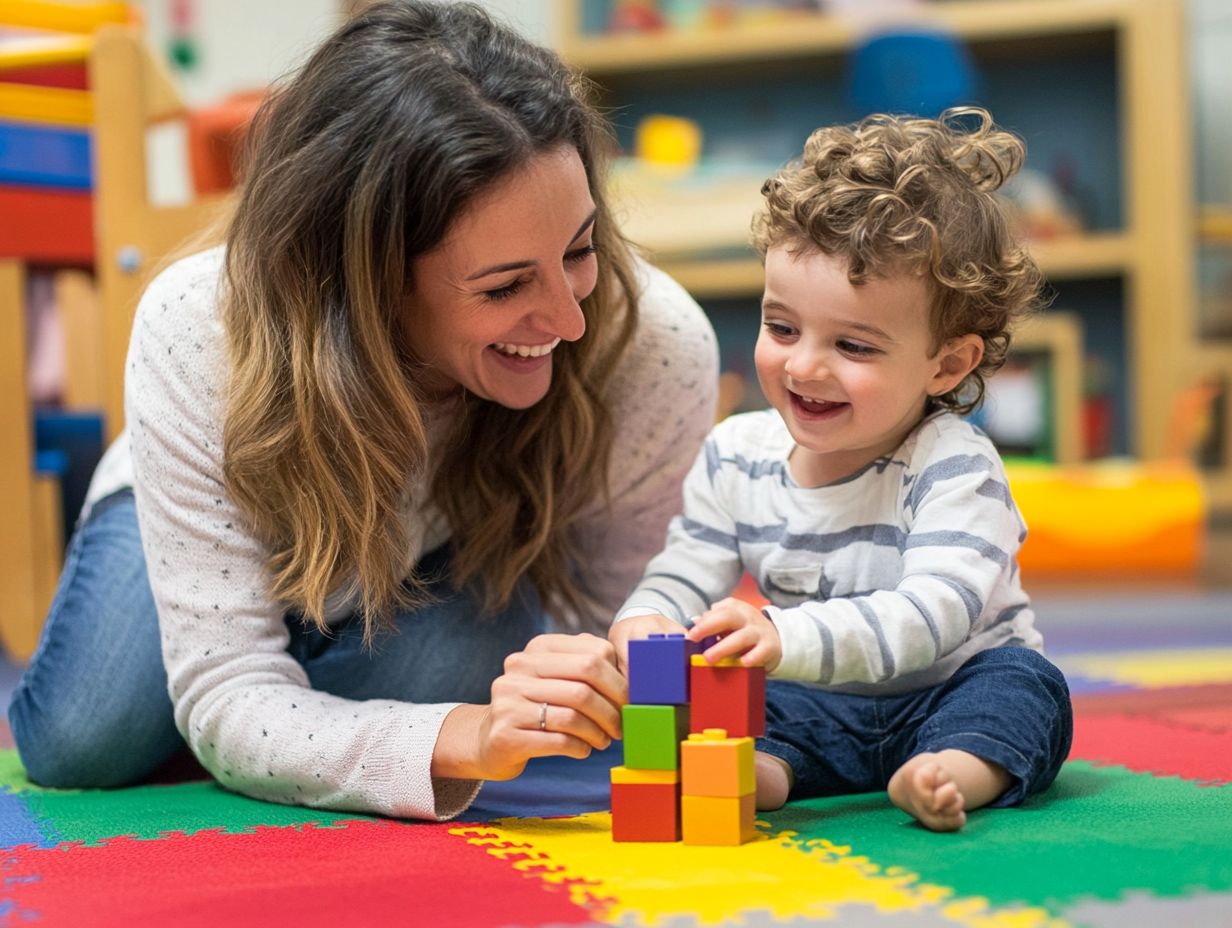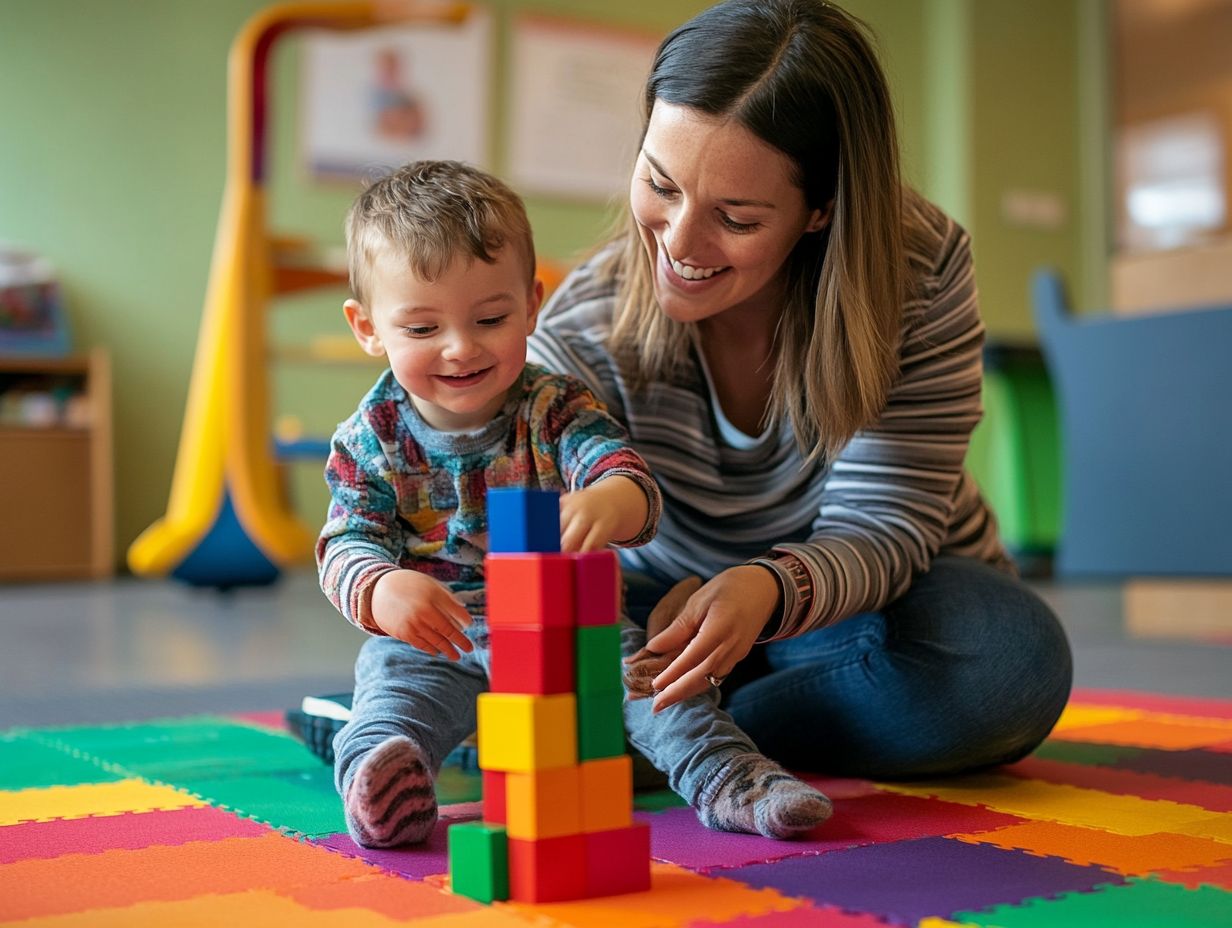The Role of Play in Parent-Child Relationships
Contents
- Understanding the Role of Play in Parent-Child Relationships
- Key Takeaways:
- The Importance of Play in Parent-Child Relationships: Insights from Developmental Psychology
- What is Play?
- Types of Play
- How Play Affects Parent-Child Relationships
- How to Incorporate Play into Parent-Child Relationships
- Overcoming Common Parenting Challenges
- Frequently Asked Questions
- Can play help improve communication between parents and children?
- What types of play are beneficial for parent-child relationships?
- Can play assist with problem-solving and conflict resolution?
- Is play still important as children get older?
Understanding the Role of Play in Parent-Child Relationships
Play is not merely an enjoyable pastime; it is an essential element in cultivating healthy parent-child relationships. By engaging in parent-child play, you foster bonding, enhance communication, and build trust.
This lays the groundwork for connections that last a lifetime. This article delves into the various types of play and their positive effects on family dynamics.
You will discover practical strategies for incorporating play into your daily routine, addressing common challenges, and ensuring that play remains a treasured aspect of your parenting journey.
Embark on this exploration of the transformative power of play and learn how it can nurture deeper relationships with your children while enhancing their social-emotional development.
Key Takeaways:

- Play is a vital tool for building strong parent-child relationships, as it helps to foster bonding, communication, trust, problem-solving skills, and emotional regulation.
- Play can take many forms, such as physical play and imaginative play, and should be tailored to a child’s age and interests to be effective.
- To successfully incorporate play into parent-child relationships, it is important to make time for it, be present and engaged, use positive parenting techniques, and make it a regular part of daily life despite potential challenges.
The Importance of Play in Parent-Child Relationships: Insights from Developmental Psychology
Play is an essential cornerstone in nurturing your relationship with your child. It significantly enhances their development through enriching playtime experiences.
By engaging in a variety of play types whether parent-directed or child-directed you not only foster emotional regulation and social skills but also strengthen attachment bonds and build resilience.
This interactive play creates strong connections while promoting cognitive flexibility and motor skills. These positive interactions bolster both your child’s health and your family dynamics, supporting overall child development.
Playtime offers benefits like the release of oxytocin and emotional support. These factors enhance the quality of your engagement with your child, making it essential for their holistic development and mental health.
What is Play?
Play is a varied activity that is essential for your child’s development. It encompasses different experiences that ignite imagination, creativity, and emotional well-being.
This engaging form of interactive behavior invites children to explore their surroundings. It fosters cognitive and social-emotional growth through a diverse array of play activities, including educational play.
Whether it s therapeutic play or unstructured play, each type brings unique advantages. These enhance skills such as problem-solving and emotional regulation while nurturing healthy development and social maturity.
Start incorporating play into your routines today and watch your relationship with your child flourish!
Types of Play
Various types of play, such as parent-directed and child-directed play, are crucial for your child’s overall growth. They address unique needs and nurture creative instincts.
Imaginative play ignites creativity. Physical play sharpens motor skills and promotes overall health. Unstructured play grants the freedom to explore, while therapeutic play offers emotional support and behavioral management, fostering resilience and positive social interactions.
Each of these play types serves distinct developmental purposes. Parent-directed play often emphasizes structured activities that introduce specific skills take cooperative games, for example, which build teamwork.
In contrast, child-directed play prioritizes your child’s autonomy, allowing them to take the lead in their exploration. This approach hones their decision-making skills.
Consider imaginative play, which shines in role-playing games where children enact various scenarios. This not only sparks creativity but also enhances their language skills through storytelling.
Physical play finds expression in activities like tag or climbing, benefiting physical health and coordination while cultivating social skills and cognitive development through interaction.
Therapeutic play, particularly through art-based activities, offers incredible benefits for emotional expression. It enables children to process feelings and develop resilience in a nurturing environment, supporting behavior management.
How Play Affects Parent-Child Relationships
Play profoundly shapes parent-child relationships, enhancing bonding and attachment through shared experiences that cultivate trust and communication.
When you engage in play together, you model positive interactions and express emotions. This can significantly bolster social skills and strengthen family dynamics, contributing to children’s psychological well-being.
Play nurtures the development of problem-solving abilities in children, highlighting the crucial role of your involvement in their emotional and social growth.
1. Bonding and Attachment
Bonding and attachment are vital outcomes of play, forging strong emotional connections between you and your children. This fosters resilience and emotional growth.
Shared play experiences help you nurture strong attachment bonds that create a secure environment, encouraging exploration and learning, as outlined by experts like Dr. Maria Montessori and Dr. Kimberley O Brien.
By engaging in a variety of play activities whether it’s building blocks, enjoying outdoor sports, or diving into imaginative role-play you actively participate in your children’s lives. This involvement crafts lasting memories that strengthen your relationships.
This not only enhances their emotional well-being but also promotes cognitive development and social maturity, helping them navigate social interactions within a safe context.
The strong attachment formed through play lays a solid foundation of trust and security, empowering your children to face challenges with confidence and building their resilience.
In such a rich environment, they learn that they have a reliable source of support to lean on, which is crucial for their overall growth and development.
2. Communication and Emotional Expression

Effective communication and emotional expression significantly flourish through play. This enables you to help your child develop crucial communication skills while helping you connect better. When you engage in playful activities, you create a safe environment where your child can freely express their feelings, thoughts, and creativity. This ultimately strengthens your bond.
Consider activities like role-playing, where your child can assume different characters. This not only allows them to explore a range of emotions and perspectives but also nurtures empathy and understanding. Arts and crafts can also be a wonderful outlet for your child to visually convey their feelings, leading to meaningful discussions about their creations. Involving play objects like costumes and puppets can further enhance these interactions.
Cooperative games that emphasize teamwork and dialogue are essential. They teach your child the value of listening and sharing ideas, enhancing their overall communication skills. These fun moments can cultivate emotional intelligence and lay the groundwork for open conversations, allowing you to connect with your child on a much deeper level.
3. Building Trust and Respect
Building trust and respect in your relationship with your child hinges significantly on the quality of the play experiences you share. By engaging in interactive play that emphasizes emotional support and enjoyment, you can enhance the dynamics of your relationship. This creates an environment where your child feels valued and understood. Activities that focus on creative play can be particularly beneficial for this purpose.
Through structured activities like board games, arts and crafts, or outdoor sports, you have the opportunity to create moments that foster open communication and cooperation. By actively participating and demonstrating genuine interest in your child’s thoughts and feelings during play, you model positive behavior and lay a strong foundation of trust. Engaging in such activities provides valuable parenting roles that enhance relationships.
These fun interactions can skyrocket your child’s confidence and impart essential life skills like problem-solving and teamwork. These moments of family fun help prevent behavior problems by promoting positive behavior.
In the long run, nurturing this playful bond cultivates a resilient relationship that encourages your child to express themselves freely and seek your guidance when needed. This ultimately contributes to healthier emotional development and mental health.
4. Strengthening Problem-Solving Skills
Through play, you enable your child to develop essential problem-solving skills that significantly enhance their cognitive development which refers to how children think, learn, and solve problems and learning outcomes. Engaging in various play activities allows them to encounter challenges, fostering critical thinking and creativity as they navigate solutions. This is strongly supported by insights from developmental psychology.
Consider imaginative play, such as role-playing scenarios; it encourages young minds to think on their feet and devise strategies in unfamiliar situations. When your child participates in building activities with blocks or LEGO, they are not just honing their motor skills they’re also learning to plan, test their designs, and troubleshoot when things don t go as expected. Such activities can be both parent-directed play and child-directed play, offering diverse learning opportunities.
You can further facilitate these enriching experiences by providing a diverse array of materials and environments for exploration, from art supplies to puzzles. By doing so, you create a stimulating atmosphere that nurtures exploration and discovery. This empowers your child to become a confident problem solver, well-equipped to face future challenges. Engaging with educational play toys also supports this development.
Don t wait to create these moments of play they are crucial for your child s growth! Start today by setting aside time for fun activities that boost your child’s development!
5. Promoting Physical and Mental Development through Play Engagement
Play is essential for promoting both physical and mental development in children. It enhances their motor skills and overall health through active engagement.
When children participate in interactive play, they support their physical growth and bolster their mental well-being. This equips them with the necessary tools for emotional regulation and building resilience.
Engaging in a variety of play activities, whether it’s running, climbing, or enjoying simple games, stimulates both gross and fine motor skills. This allows children to develop their coordination and strength.
Playful interactions foster creativity and encourage problem-solving, vital for cognitive and social-emotional development. Through these experiences, children navigate social dynamics, learn collaboration, and express their emotions more effectively important building blocks for their overall health.
Prioritizing playtime goes beyond mere enjoyment; it is a fundamental aspect of nurturing well-rounded, healthy individuals who thrive physically and emotionally. Playtime benefits include mental adaptability and emotional growth, leading to stronger relationships and improved social skills.
How to Incorporate Play into Parent-Child Relationships
Incorporating play into your relationship with your child demands intentionality and creativity. By prioritizing quality play and family activities, you can significantly enhance your engagement.
Finding time for play and selecting age-appropriate activities allows you to craft enriching experiences that nurture growth and strengthen your connection.
1. Finding Time for Play
Finding time for play amid your busy schedule can indeed be a challenge. Yet, it s crucial for fostering your involvement as a parent and ensuring quality play experiences for your children.
By prioritizing designated playtime and weaving playful interactions into your daily routine, you create meaningful opportunities for connection and relationship enhancement.
To tackle the complexities of balancing work, chores, and family time, consider implementing small, consistent adjustments that can be transformative. For instance, setting aside just 15 minutes each day for unstructured play can invigorate the family dynamic in unexpected ways.
Involving your children in everyday tasks like cooking or gardening offers playful engagement without needing extra time. You can also take advantage of public parks or community events like Pinwheels Family Fun Day to blend social interaction with recreational activities, enriching both your experiences and those of your children.
These strategies cultivate a playful environment and strengthen emotional bonds, ensuring that play remains a vital part of your family life.
2. Choosing Age-Appropriate Activities

Choosing age-appropriate activities is essential for maximizing the benefits of play. By aligning with principles of developmental psychology, you ensure that children engage in activities that foster optimal learning outcomes.
Tailoring these activities to a child’s developmental stage enhances their engagement and enjoyment. For example, toddlers benefit from simple stacking toys and shape sorters, which help refine their motor skills and cognitive abilities.
As children enter preschool, interactive activities like puzzle-solving and group games become vital, encouraging social skills and enhancing problem-solving capabilities. Meanwhile, school-aged children flourish with more structured activities such as team sports or arts and crafts, supporting both physical development and creative expression.
These examples highlight the importance of matching activities not only to age but also to the unique developmental stages that children experience, promoting essential skills contributing to their overall growth and learning.
3. Allowing Children to Lead and Be Creative
Letting your children take the lead and express their creativity during play fosters independence and sparks imaginative thinking. Both are vital for their cognitive flexibility and emotional growth.
By embracing child-directed play, you empower them to explore their interests and develop unique solutions to the challenges they face.
This type of play cultivates autonomy and enhances problem-solving skills as they create their own stories. You can facilitate this enriching experience by providing a variety of open-ended materials think blocks, art supplies, or dress-up costumes that offer endless opportunities for creativity.
By stepping back and giving your children the space to make their own choices during playtime, you encourage them to think critically and express their ideas without fear of judgment. Ultimately, nurturing this independence through self-directed play can lead to increased confidence and resilience essential traits that support their overall development.
4. Being Present and Engaged
Being fully present and engaged during play is essential for fostering positive interactions. This ensures that the experience is enriching for both you and your children.
Your active participation enhances your involvement, allowing you to model social skills and provide emotional support.
When you engage in playtime, you create a safe environment where your children feel valued and understood. This promotes a deeper emotional connection, strengthening your relationship while teaching critical problem-solving and communication skills.
To elevate your engagement and improve parent involvement, consider:
- Setting aside dedicated playtime.
- Asking open-ended questions during activities.
- Co-creating narratives in games.
These strategies encourage your children to express themselves freely and allow you to observe their interests and challenges. This leads to improved emotional regulation and social competence.
Dr. Emily Freeman recommends such techniques for fostering positive interactions and building attachment bonds. These interactions build a foundation of trust and support, which is crucial for healthy development.
Through these practices, parents can enhance their parenting techniques and contribute to their child’s psychological well-being and mental health.
5. Making Play a Regular Part of Daily Life
Incorporating play into your daily life is a game-changer for your family! It is crucial for reinforcing bonds and ensuring that your children receive consistent developmental benefits.
By establishing routines that include family activities centered around play, you create an environment that nurtures creativity, emotional support, and joyful interactions.
Engaging in family fun and memorable moments contributes significantly to a child’s overall growth and learning.
To effectively weave play into your everyday life, consider setting aside specific times solely for playful interactions, such as game nights or arts and crafts sessions. Don’t overlook those small, spontaneous play moments like impromptu dance parties or nature walks that can truly enrich your daily routine.
You might also incorporate play into household chores, turning tasks into fun challenges where your children can lend a hand.
By consistently prioritizing play, you nurture your children’s cognitive and social skills while strengthening the bonds that contribute to overall family harmony and emotional resilience.
According to Dr. Kimberley O Brien, such activities release oxytocin, enhancing emotional bonds and reducing behavior problems.
Overcoming Common Parenting Challenges
You may encounter common challenges like a lack of time, differing play preferences, and the struggle to balance responsibilities. These can impede the integration of play into your parent-child relationship.
Recognizing these obstacles empowers you to create strategies that foster engagement and cultivate quality play experiences, even amid a busy schedule.
Dr. Maria Montessori’s principles can guide parents in creating enriching play environments. Start making play a priority today to unlock your child s full potential!
1. Lack of Time and Energy in Parenting Roles
The challenge of juggling time and energy is a significant barrier many parents encounter when it comes to engaging in quality play with their children. However, this obstacle can be effectively tackled through smart time management and by prioritizing play amidst the daily whirlwind of responsibilities.
To navigate this landscape, you can implement practical strategies, such as crafting a structured daily routine that includes designated playtime.
By reserving just 15-30 minutes each day even within the busiest of schedules you can cultivate meaningful interactions that enrich your relationship with your child. Finding ways to incorporate play into everyday tasks, like turning chore time into a playful game, can maximize both connection and productivity.
It’s essential to maintain your energy levels, as feeling energized allows you to engage more fully in those precious moments. Simple practices, like taking short breaks to recharge or enjoying a light snack, can boost your vigor. This ultimately makes playtime not only more enjoyable but also more effective.
Additionally, consider Parent-Child Interaction Therapy (PCIT), a method that helps improve the relationship between parents and children through guided play and communication. This can provide strategies for managing energy and enhancing play engagement.
2. Differences in Play Preferences

Differences in play preferences between you and your child can present unique challenges when trying to find common ground during playtime. However, open communication and negotiation are essential tools for navigating these differences, fostering an environment rooted in mutual respect and understanding.
This is particularly important for managing sibling rivalry and ensuring each child’s needs are met. By discussing your individual likes and dislikes candidly, you and your child can unearth new ways to blend your interests.
For example, if your child adores action figures while you lean towards board games, why not collaborate to create a themed board game that incorporates those action figures? This approach allows both of you to engage in a shared experience that celebrates your preferences.
Ms. Smith, an expert in child-directed play, emphasizes the importance of such collaborations in fostering family dynamics. Emotional support during these conversations is vital; validating your child’s excitement about their choices encourages them to express themselves more freely.
Setting aside dedicated playtime where each of you can showcase your favorite activities enhances appreciation for one another s tastes. This ultimately leads to richer and more enjoyable interactions.
3. Balancing Play with Other Responsibilities
Balancing play with your other responsibilities is essential for nurturing healthy family dynamics and ensuring that your children receive the developmental support they need. By establishing priorities and recognizing the intrinsic value of play, you can seamlessly integrate enjoyable interactions into your busy life.
In a world that relentlessly demands your attention and productivity, it s crucial to carve out dedicated moments for play. This isn t just about fostering your child s growth; it s also about nurturing the bonds that hold your family together.
Incorporating playtime into your daily routine can be as straightforward as setting aside some time after dinner for board games or enjoying outdoor activities on the weekends.
By prioritizing these moments, you create a joyful atmosphere that encourages communication, understanding, and bonding.
Being intentional about selecting activities that resonate with everyone’s interests transforms play into a shared experience, strengthening family ties while delivering vital developmental benefits for your children.
Frequently Asked Questions
What is the role of play in parent-child relationships?
Play is an essential component of healthy parent-child relationships, as it allows for bonding, communication, and overall development for both the parent and child.
How does play benefit the parent-child relationship?
Play provides a fun and relaxed environment for parents and children to engage with each other, creating happy memories and strengthening the bond between them.
Can play help improve communication between parents and children?
Absolutely! Play allows for creative interactions that help children express themselves. Parents can also better understand their child’s thoughts and feelings.
What types of play are beneficial for parent-child relationships?
Many types of play can enhance parent-child relationships. These include pretend play, physical activities, and simple games that both enjoy.
Can play assist with problem-solving and conflict resolution?
Yes! Play provides a safe way for parents and children to work through conflicts and explore solutions together. It also helps children develop important problem-solving skills.
Is play still important as children get older?
Definitely! Although the nature of play may change, it remains crucial for parents to engage in playful activities. This connection fosters strong communication.
So why not start playing today? Engage with your children and see the benefits of play in your relationship!






